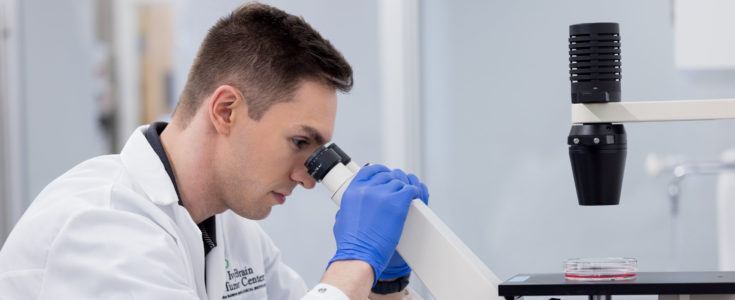
Newsroom
Ivy Brain Tumor Center Collaborates with GSK on New Phase 0 Clinical Trial to Evaluate Niraparib in Patients with Brain Cancer

Study will enroll a total of 42 patients with newly diagnosed glioblastoma and recurrent grade II-IV gliomas
PHOENIX, ARIZ., Nov. 2, 2021 – The Ivy Brain Tumor Center at Barrow Neurological Institute and UC San Francisco announced the opening of a Phase 0 clinical trial to evaluate niraparib (ZEJULA), an oral, once-daily poly (ADP-ribose) polymerase (PARP) inhibitor from GSK, for patients with newly diagnosed glioblastoma (GBM) and recurrent glioma (grades II-IV).
The Phase 0 clinical trial will enroll up to 42 participants divided into two groups, Arm A for newly diagnosed glioblastoma patients, and Arm B for recurrent glioma patients with IDH mutation and ATRX loss. The Ivy Brain Tumor Center will accrue patients in both Arms; and UCSF will accrue patients only in Arm B.
The initial launch of the Phase 0 clinical trial with niraparib will begin by enrolling six Arm A participants to determine the Optimal Time Interval (OTI) – the time interval between the last dose of the drug and the tumor resection that can detect maximum unbound drug concentration in the gadolinium nonenhancing region of the tumor. After OTI is determined, the remaining 18 participants will enroll in Arm A and up to 18 participants will enroll in Arm B.
In both Arms, participants will receive niraparib once a day for four days before their scheduled surgery to test how much of the investigational drug is present in tumor, blood, and cerebrospinal fluid (CSF). Arm A participants with tumors with a positive pharmacokinetics (PK) response will advance to a therapeutic expansion phase that combines therapeutic dosing of niraparib plus standard-of-care fractionated radiotherapy; Arm B participants with positive pharmacodynamics (PD) response will advance to a therapeutic expansion phase of niraparib monotherapy until progression of the disease. GSK’s niraparib has good bioavailability and shows strong synergy with temozolomide, as well as radiation in various preclinical studies.
“By evaluating PK- and PD-dependent endpoints in our Phase 0 clinical trials, brain tumor patients who advance to the expansion phase can feel confident that there is biological evidence suggesting their tumor can respond,” said Nader Sanai, MD, director of the Ivy Brain Tumor Center and director of neurosurgical oncology at Barrow Neurological Institute. “If the drug shows no effect on the brain tumor, patients can transition to another therapy or clinical trial without losing time.”
“Our team at UCSF was instrumental in designing the PD assay for Arm B of this study and we’re proud to collaborate with the Ivy Brain Tumor Center to bring a potential new treatment option to the brain tumor community,” said Susan Chang, MD, professor of neurological surgery at UCSF. “The Ivy Center’s innovative Phase 0 approach streamlines the drug testing and approval process and together we can swiftly evaluate niraparib for patients with newly diagnosed glioblastoma and recurrent gliomas.”
New Therapeutics for Brain Cancer Needed
In the United States, about 6 to 8 per 100,000 people are diagnosed with a WHO grade III or IV primary brain tumor each year, with an average survival after diagnosis ranging from 12-16 months. The standard of care for treating high-grade gliomas consists of maximal resection, radiation and a chemotherapy drug called temozolomide (TMZ), extending patient survival to a certain point and then these tumors typically recur.
The Ivy Brain Tumor Center is singularly focused on discovering new therapies for brain tumor patients through a broad portfolio of pharmacodynamic- and pharmacokinetic-driven clinical trials, combining industry-partnered drug development with the nation’s largest operative brain tumor volume. The niraparib study is one of seven clinical trials open at the center.
This study is funded by the Ben and Catherine Ivy Foundation, in partnership with the Barrow Neurological Foundation. Additional clinical trial information can be found at NCT05076513 or the Ivy Brain Tumor Center’s website.
About niraparib
GSK’s niraparib (ZEJULA) is an oral, once-daily PARP inhibitor that is currently being evaluated in multiple pivotal trials. GSK is building a robust niraparib clinical development programme by assessing activity across multiple tumour types and by evaluating several potential combinations of niraparib with other therapeutics. The ongoing development programme for niraparib includes several combination studies.
In 2020, the Food and Drug Administration approved niraparib as a monotherapy maintenance treatment of adult patients with advanced epithelial ovarian, fallopian tube, or primary peritoneal cancer who are in a complete or partial response to first-line platinum-based chemotherapy, regardless of biomarker status.
About Ivy Brain Tumor Center
Ivy Brain Tumor Center at the Barrow Neurological Institute in Phoenix, AZ is a non-profit translational research program that employs a bold, early-phase clinical trials strategy to identify new treatments for aggressive brain tumors, including glioblastoma. The Ivy Center’s Phase 0 clinical trials program is the largest of its kind in the world and enables personalized care in a fraction of the time and cost associated with traditional drug development. Unlike conventional clinical trials focusing on single drugs, its accelerated trials program tests therapeutic combinations matched to individual patients. Learn more at IvyBrainTumorCenter.org. Follow the Ivy Brain Tumor Center on Facebook, Instagram, Twitter and LinkedIn.
About UCSF
The University of California, San Francisco (UCSF) is exclusively focused on the health sciences and is dedicated to promoting health worldwide through advanced biomedical research, graduate-level education in the life sciences and health professions, and excellence in patient care. UCSF Health, which serves as UCSF’s primary academic medical center, includes top-ranked specialty hospitals and other clinical programs, and has affiliations throughout the Bay Area. UCSF School of Medicine also has a regional campus in Fresno.
